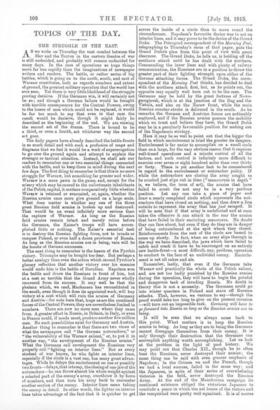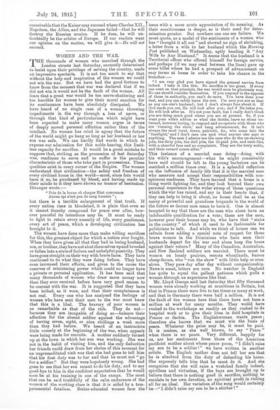TOPICS OF THE DAY.
THE STRUGGLE IN THE EAST.
AS we write on Thursday the vast combat between the Slav and the Teuton in the eastern theatre of war is still undecided, and probably will remain undecided for many days. In the case of operations so huge things move far less rapidly than the imaginations of newspaper writers and readers. The battle, or rather series of big battles, which is going on to the north, south, and east of Warsaw constitutes, both as regards numbers and extent of ground, the greatest military operation that the world has ever seen. Yet there is very little likelihood of the struggle proving decisive. If the Germans win, it will certainly not be so ; and though a German failure would be fraught with terrible consequences for the Central Powers, owing to the losses of men which. could not be replaced, it would be far too much to say that even in that case the result would be decisive, though it might fairly be described as the beginning of the end. We are viewing the second act of the drama. There is bound to be a third, or even a fourth, act whichever way the second act goes, The daily papers have already described the battle-fronts in so much detail and with such a, profusion of maps and diagrams that we feel it would be a work of supererogation to go over the ground again and attempt to explain the strategic or tactical situation. Instead, we shall ask our readers to remember one or two essential things connected with the battle, and to keep thorn in mind during the next few days. The first thing to remember is that this is no mere struggle for Warsaw, but something far greater and wider. Warsaw is a mere pawn in the game, and, except for the misery which may be caused to the unfortunate inhabitants of the Polish capital, it matters comparatively little whether Warsaw is retained or evacuated, or, again, whether the Russian armies once more give ground on a large scale. What does matter is whether any one of the three great Russian field armies is broken up and destroyed. That would be an event infinitely more serious than the capture of Warsaw. As long as the Russian field armies remain intact and merely retire before the Germans, the Kaiser's troops will have accom- plished little or nothing. The Kaiser's essential task is to destroy the Russian fighting force, not to invade or conquer Poland, or even half a dozen provinces of Russia. As long as the Russian armies are in being, vain will be the boasts of German successes.
The next thing to remember is the lesson of the Pyrrhic victory. Triumphs may be bought too dear. But perhaps a better analogy than even the action which caused Pyrrhus's gloomy reflection that another victory over his enemies would undo him is the battle of Borodino. Napoleon won the battle and drove the Russians in front of him, but at a cost so terrible that the Grand Army never wholly recovered from ite success. It may well be that the phalanx which, we read, Matkensen has reconstituted in the south, even though it does its appointed work, will buy victory at a cost which will ruin the armies of Germany and Austria—for note here that, huge mime the combined forces of the Central Powers, they are nevertheless limited in numbers. There are now no more men where they came from. A greater effort in Russia, in Britain, in Italy, or even in France could, if needs must, produce another five million men. No such possibilities exist for Germany and Austria. Another thing to remember is that there are two views of what the newspapers call " the German nutcrackers," or the vulnerability of the Warsaw salient," or, to put it in another way, " the envelopment of the Russian armies." What the Germans call envelopment the Russians very properly call "lighting on interior lines." But as every student of war knows, he who fights on interior lines, especially if the circle is a vast one, has many great advan- tages. While he delays the encirclement on one or possibly two fronts—delays, that isto say, the closing of one jawof the nut crackers—ho can throw almost his whole weight against a selected part of the enemy's army, overthrow it by force of numbers, and then turn his army back to encounter another section of the enemy. Interior lines mean taking t he enemy in detail. In other words, the fighter on interior lines takes advantage of the fact that it is quicker to get across the inside of a circle than to move round the circumference. Napoleon's favourite device was to act on interior lines, and it may prove to be the device of the Grand Duke. The Petrograd correspondent of the Morning Post, telegraphing to Thursday's issue of that paper, puts the Grand Duke's plan from this point of view with great clearness. The Grand Duke, he tells us, is holding off the southern attack until he has dealt with the northern. Commanding the inner lines and with plenty of railway communication, the Russians are in a position to throw the . greater part of their fighting strength upon either of the German attacking forces. The Grand Duke, the corre- spondent of the Morning Post thinks, has decided to deal with the northern attack first, but, as he points out, the opposite may equally well turn out to be the case. The Germans may be held by the great fortress of Nowo- georgievsk, which is at the junction of the Bug and the Vistula, and also on the Narew front, while the main Russian counter-stroke is delivered in the south. As he remarks, the German and Austrian forces are noticeably scattered, and if the Russian armies possess the mobility which we trust and believe they have, the Grand Duke may be in a peculiarly favourable position for making use of the Napoleonic strategy.
Here it may be as well to point out that the bigger the field in which encirclement is tried the greater its dangers. Encirclement is far easier to accomplish on a small scale than on a large, for the very obvious reason that it requires well-timed operations and a minute control of all the factors, and such control is infinitely more difficult to exercise over seven or eight hundred miles than over thirty or forty. There is yet another fact to be remembered in regard to the encirclement or nutcracker policy. If while the nutcrackers are closing the army sought to be crushed just slips out in time ("manoeuvres in depth " is, we believe, the term of art), the armies that have failed to crush the nut may be in a very perilous position. Let any one take a, piece of paper and draw a nearly completed circle which represents the nut- crackers that have closed on nothing, and then draw a line outside to represent the army that has just escaped. It will be seen that if that army is undefeated and at once takes the offensive it can attack in the rear the armies that have failed in their encircling manoeuvre. No doubt they can face about, but even if they do they are in danger of being outnumbered at the spot where they closed. Reinforcements from the rest of the circle are bound to come up slowly. In fact, when an army slips through in the way we have described, the jaws which have failed to catch and crack it have to be rearranged on an entirely new battle-front—a most difficult, nay, perilous, operation to conduct in the face of an undivided enemy. Encircle- ment is not all cakes and ale.
Remember, lastly, that even if the Germans take Warsaw and practically the whole of the Polish salient, and are not too badly punished by the Russian armies during the operation, they will have to begin the painful and dangerous task of invading Russia. No doubt in theory this is not a necessity. The Germans could go into winter quarters in Poland and stave off Russian attacks. That, however, we venture to say—though the proof would take too long to give on the present occasion —will turn out an impossible task. Germany will have to go forward into Russia as long as the Russian armies are in being. It will be seen that we always come back to this point. What matters is to keep the Russian armies in being. As long as they are in being the Germans cannot disengage themselves from their enemy. It is only through their destruction that the Germans can accomplish anything worth accomplishing. Lot us look at the problem in the light of past history. Wo may point out that Charles XII., though he so often beat the Russians, never destroyed their armies ; the same thing can be said with even greater emphasis of Napoleon; in the Crimea we and the French, though we had a local success, failed in the same way ; and the Japanese, in spite of their series of overwhelming victories in the field, never destroyed the Russian Army. At the end of the Manchurian campaign its continued existence obliged the victorious Japanese to conclude a peace in which the net losses of the victors and the vanquished wore pretty well equalized.. It is of course conceivable that the Kaiser may succeed where Charles XII., Napoleon, the Allies, and the Japanese failed—that he will destroy the Russian armies. If he does, he will un- doubtedly be the arbiter of Europe. If our readers want our opinion on the matter, we will give it—Hs will not succeed.



































 Previous page
Previous page